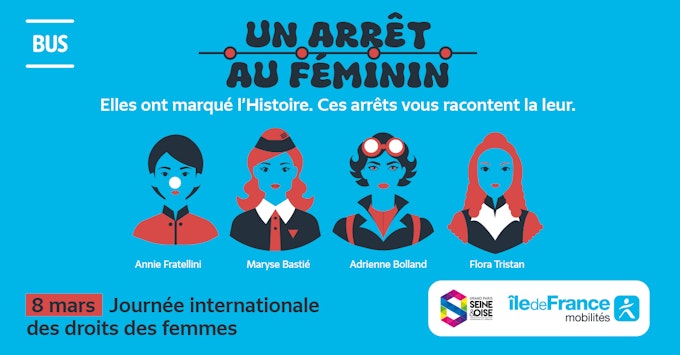
Who are these women?
- Annie Fratellini: clown, musician, actress and singer, this French jack-of-all-trades artist has devoted her life to the art of the circus and the performing arts. His performances combined humor, poetry and emotion by adding a delicious musical touch thanks to a perfect mastery of several instruments. The first woman to play the clown Auguste and one of the few to play the concertina, Annie Fratellini left her mark on the circus world with her unique style. His work captivated audiences for several decades. With her husband, she opened the National Circus School. Even today, she remains an important figure in the world of entertainment.
Find its history at the stop dedicated to it in Vernouillet and on your lines 14, 15, 43, 63, 67, 68, 69, 75 and 92.
- Maryse Bastié: born Bombec in 1898, is a pioneer of French aviation. She became one of the first women to obtain a pilot's license in 1925. In 1930, she achieved a feat by breaking the women's record for flight time. With this record, she was awarded the Knight's Cross of the Legion of Honor and became the first French woman to receive the Harmon Trophy. During the Second World War, she distinguished herself as a pilot by participating in transport missions. She died in 1952 in a plane crash, living her passion to the end and becoming a source of inspiration for many women throughout the ages and the world.
Find out more about his story at the stop dedicated to him in Les Mureaux and on your lines 6 and 58.
- Adrienne Bolland: In 1920, this French aviation pioneer became the first woman to fly across the English Channel from France. Then the following year, in 1921, the first woman to cross the Andes, a significant feat in the history of aviation. His courage, accomplishments and determination made him an emblematic figure of French aviation at the beginning of the twentieth century.
Find out more about his story at the stop dedicated to him in Poissy and on your line 3.
- Flora Tristan: a true pioneer of feminism and social struggle, this French writer has distinguished herself by her fierce activism. Coming from a noble family, Flora Tristan lived a difficult childhood and an unhappy marriage, from which she had the courage to divorce. Very quickly, she put her determination at the service of the rights of women and workers by regularly advocating for their economic and social emancipation through her writings. Her major work, known under the title The Emancipation of Women or The Testament of the Paria, denounced gender inequalities and working conditions. Flora Tristan died prematurely at the age of 41 in 1844. But her influence in the history of social and feminist movements is still very much alive!
Find out more about his story at the stop dedicated to him in Carrières-sous-Poissy and on your lines 1, 31, 51 and 94.
This event pays tribute to women who have made history, thus contributing to the recognition of their actions.